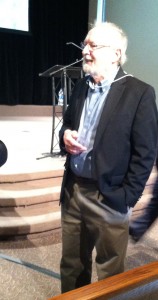Last week I attended the conference of the Biola Center for Christian Thought, which is the annual capstone event at the CCT. This year’s research theme was “Intellectual Virtue and Civil Discourse,” and the conference featured a number of noteworthy scholars who have done significant work in areas related to the theme. Among them were Robert Audi (University of Notre Dame),

Jason Baehr (Loyola Marymount University), Elaine Howard Ecklund (Rice University), George Marsden (University of Notre Dame, retired), Robert Roberts (Baylor University), Richard Mouw (Fuller Theological Seminary, retired), and Martin Marty (University of Chicago, retired). In addition to the presentations by these plenary speakers, there were many other excellent presentations at breakout sessions.
Thanks to the John Templeton Foundation, I was honored to be a CCT research fellow during the Fall semester this past academic year. My research project regards the virtue of open-mindedness, and I was able to make significant progress on what I hope will culminate in a monograph on the subject. My presentation at the CCT conference, entitled “Open-

mindedness and Disagreement,” explored the connection between two topics that are germane to this year’s theme. With regard to the issue of disagreement, the question is whether, or to what extent, confidence in your belief about an issue should be tempered by the fact that some epistemic peers disagree with you. And, depending upon your view regarding the epistemic implications of peer disagreement, what does it mean to remain open-minded about the issue? My session was well-attended, and I received helpful feedback, which I am looking forward to implementing in my paper as I revise it and eventually submit it for publication.
The most enjoyable thing about the conference was catching up with some of the scholars I’ve gotten to know through the CCT and other contexts, as well as becoming acquainted with a number of other scholars whom I’d never met before. Some of these I had only admired from afar, such as the eminent

epistemologist Robert Audi and religious scholar Martin Marty, who might be the greatest living scholar in the English speaking world—author of more than 80 books, winner of numerous scholarly awards, member of two U.S. Presidential Commissions, and holder of 80 (yes, eighty) honorary doctorates. Somehow I ended up sitting next to Marty at the evening banquet at the CCT conference, and I was struck by the warm humor and genuine humility of the man. What an inspiration.
In fact, the word “inspiring” well captures my entire experience at the Biola Center for Christian Thought this year. The CCT directors—Thomas Crisp, Steve Porter, and Gregg Ten Elshof—as well as staff members Evan Rosa and Laura Pelser, are all wonderful folks who know how to create a dynamic community atmosphere for rich scholarly research and dialogue. The Center is currently accepting proposals for the 2016-17 research theme: “Humility: Moral, Religious, and Intellectual.” If you do work related to this topic and would like an opportunity to dig a lot deeper, then consider submitting a proposal. I guarantee that the experience would be a highlight of your academic career!

Stephen Hoffmann
Marty is one of those rare people who (I assume) is inclined to be theologically liberal while genuinely respecting evangelicals as partners in discourse. Also, with regard to his prowess, I remember one awe-struck colleague recounting that while he was in Marty’s office Marty got a call from Time magazine about something and proceeded to in effect compose an article on the spot over the phone!
If you continue your research on open-mindedness, you might be interested in looking at the following books: “Democracy and Disagreement” (Amy Gutmann and Dennis Thompson); two works by Kent Greenawalt (“Private Conscience and Public Reason,” and “Religious Convictions and Political Choce”); and Brendan Sweetman, “Why Politics Needs Religion: the Place of Religious Arguments in the Public Square.” Gutmann/Thompson and Greenawalt rather delegitimize religious conviction as part of public policy discourse, something that is criticized in a review of the formers’ book by Jeffrey Rosen here: http://www.nytimes.com/1996/12/29/books/in-search-of-common-ground.html
Rosen concludes that their concept of “deliberative democracy” rules out in advance moral arguments that do not conform to the ground rules of deliberation the authors say are necessary if there is to be any common ground. The Sweetman book is a worthy Christian response. Some 20 years later public discourse is really endangered by the illiberal rejection of religious conviction in the face of the assertion of LGBT rights.